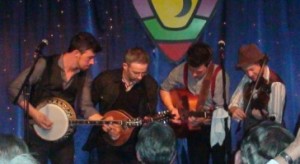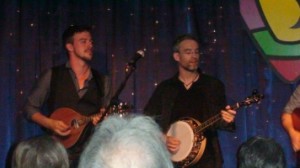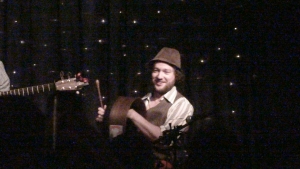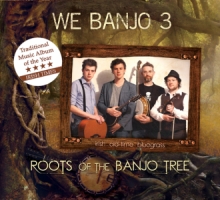I have a special nook in my heart for Celtic folk music, born of my childhood adventures visiting the UK while living in West Germany, and then my actual residence in the UK from 1995-2000. The annual festival Celtic Connections in Glasgow, loaded with fiercely talented musicians and bands, sealed the deal for me as an avid fan of the genre, and so when I hear of a good band touring in my neck of the woods, I like to take

L to R: Martin Howley, Enda Scahill, David Howley, and Fergal Scahill
advantage of the opportunity to check them out. This is what brought me to Moonlight on the Mountain this past September 5 to hear the fiery strains of fiddle, the primal beats of bodhran, the harmonious textures of guitar, and the mesmerizing riffs of mandolin and tenor banjo produced by the Irish band We Banjo 3. As the title implies, the crux of this band’s edge lies in their stellar performances on banjo—tenor banjo, to be exact. Enda Scahill, a leading Celtic banjo instrumentalist in Ireland, has extensive credits including recording with Ricky Skaggs, guesting with The Chieftains, touring with Frankie Gavin and Stockton’s Wing, and was a member of the band The Brock McGuire Band which was awarded the Instrumental Band of the Decade by the Irish American News. He has also penned Celtic banjo tutorial books that are the top-selling in Ireland. In this new-formed band that has already won the Music Network Young Musicwide Award, Enda has teamed up with his own brother Fergal Scahill (a Champion in Irish fiddle and bodhran who has played with many bands and released solo albums), and two other banjo-picking brothers. The first, Martin Howley, is a 7-time All Ireland Banjo Champion, and the first Irish banjo player to grace the stage of the Grand Ole Opry. David Howley, the other equally talented brother and former member of the band Free Wheel, is responsible for lead vocals, rhythm guitar, and plays other instruments in the band as needs call for it. The result of the union of these two sets of brothers is a musical tour de force of mastery, virtuosity, and expression in the realm of traditional folk music.

Martin Howley and Enda Scahill
But what makes We Banjo 3 unique is that they did not go the usual route of performing all-Celtic music like most Celtic bands do. In their quest to honor the banjo as an instrument that has stretched its neck into many styles of music, their first album embraces traditional music in the styles of American Old-Time, Ragtime, Bluegrass, and Irish. Enda explained during a set break that their album was meant to cover these different styles as a way of tracing the development of the banjo, which took place in America after being brought over by slaves from Africa. Preceding the Old-Time, Ragtime, Bluegrass, and Irish styles, banjo music was most influenced by traveling minstrels. On the arrival of the banjo in Ireland, he relates, “The minstrels were performers that traveled all over America and the world. Eighty percent of the minstrel groups were Irish. But the most famous of the minstrel groups was the Virginia Minstrels. And just to make the connection with Ireland, the first time the banjo made an appearance in Ireland was in the mid-1800’s, and it was the Virginia Minstrels that brought the instrument there.”
To honor the influence of banjo in Ireland, their new album Roots of the Banjo Tree starts with a tribute to the famous County Sligo fiddler Martin Wynne in a set of two reels (#2 & #1) he composed himself, followed by the “Coalminer Reel” from the Flanagan Brothers. The next track “Gonna Write Me a Letter” features David Howley’s rich baritone voice harmonized by Louise Holden. It’s a tune penned by Ola Belle Reed of North Carolina and is a gorgeous minor tune drenched in Appalachian style. We Banjo 3 go on from there, traveling through old time tunes by American Fiddlers such as “The Lost Indian,” “Sail Away Ladies,” “Kitchen Girl,” “Over the Waterfall,” and “Liberty Polka.” “Bill Cheatum” of the bluegrass tradition makes an appearance in this collection, as well as minstrel tunes such as “Poor Old Liza Jane” and “Dance Boatman Dance” (from Dan Emmet of the Virginia Minstrels). There is much more in this wonderful album, a must-have CD if you wish to have a well-rounded collection of musical history. And needless to even say, the instrumentation is superb. The only thing to top the album is their live performance, full of character, energy, humor, and intensity.

Fergal Scahill during a bodhran solo.
Take a look below at their opening set that night for a taste of their live show, and as an added bonus, there’s a video snippet I took of an unbelievable bodhran solo from Fergal Scahill. I doubt you will see better without a lot of digging. And his personality mixed with the performance makes it that much more entertaining.
We Banjo Three at Moonlight on the Mountain
Fergal Scahill Bodhran Solo




